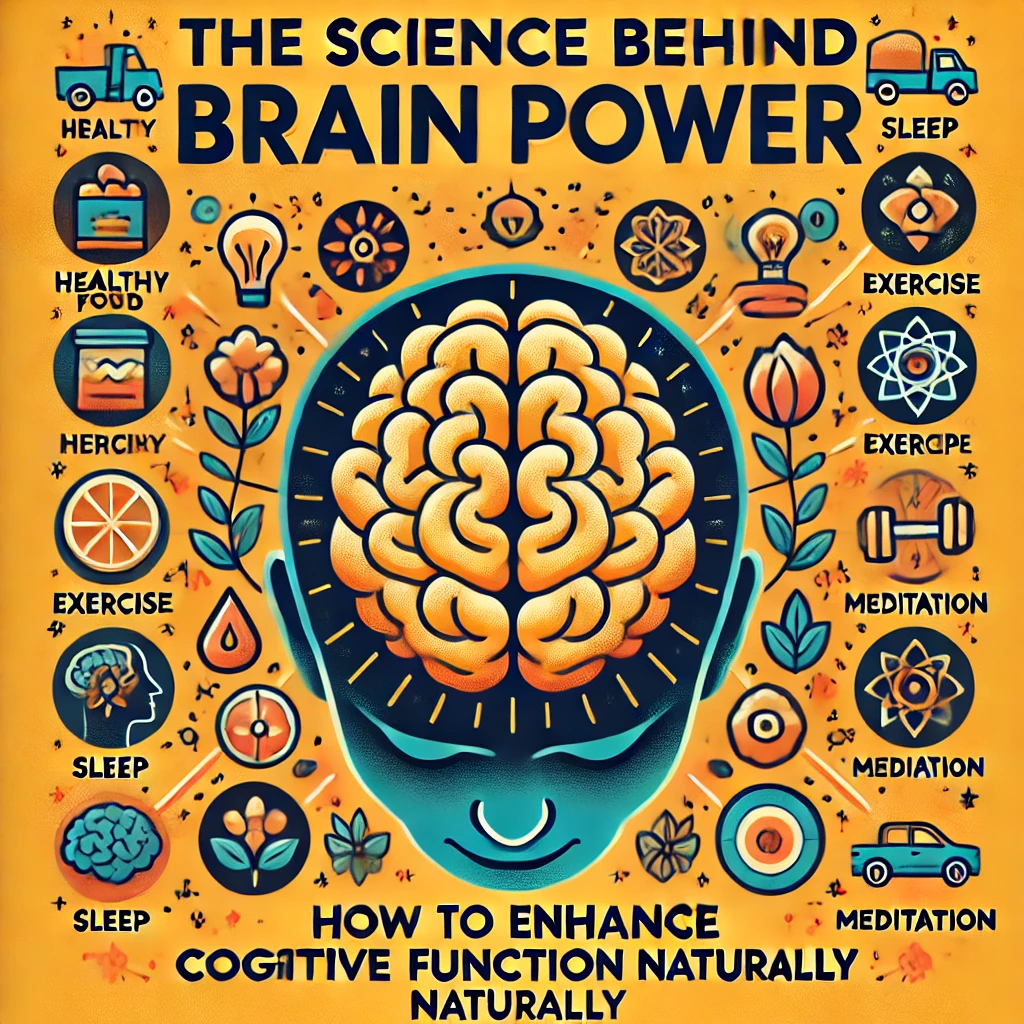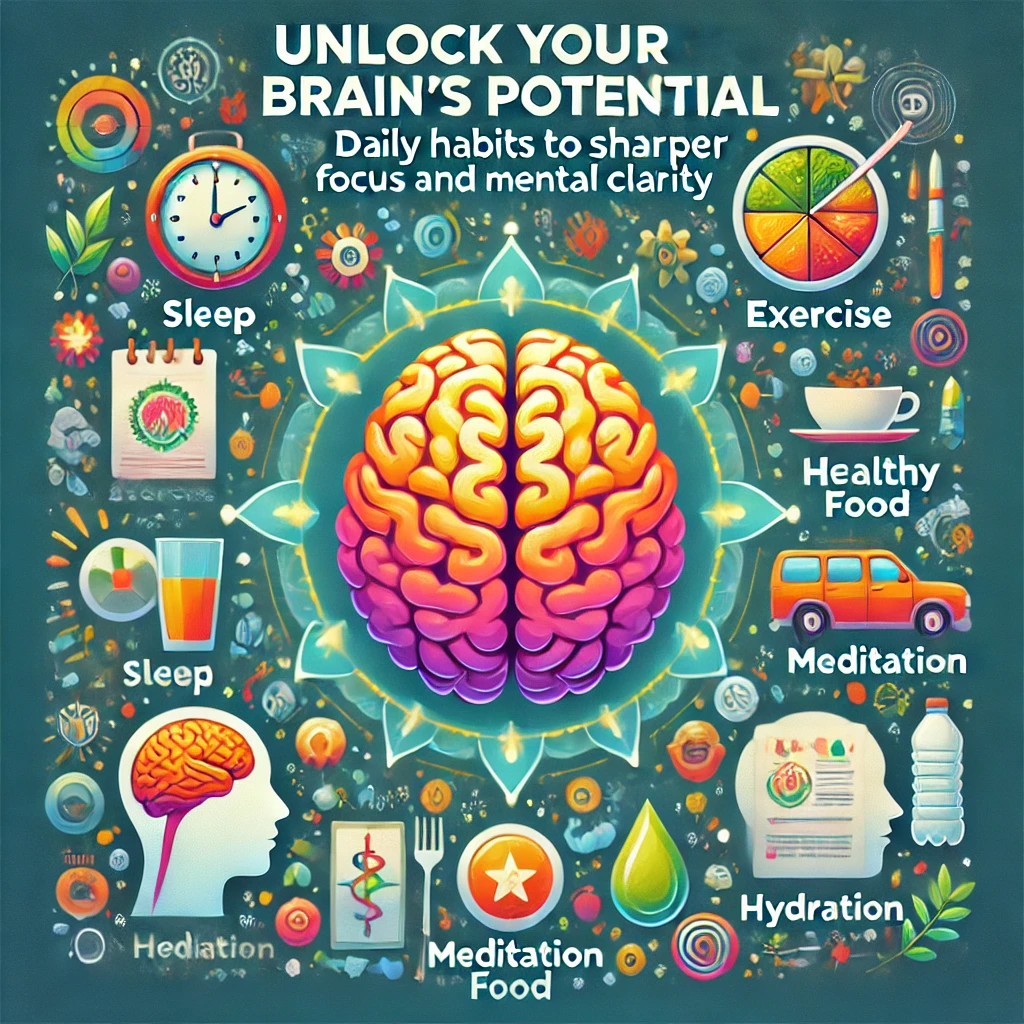Introduction
Brain power isn’t just about intelligence; it’s about focus, memory, adaptability, and mental clarity. For most of us, staying sharp and enhancing cognitive function naturally is a top priority, especially as we juggle demanding schedules and countless distractions. Fortunately, there are scientifically-backed ways to increase brain power without relying on synthetic stimulants or quick fixes.
In this guide, we’ll dive into the science behind brain power and explore natural cognitive boosters that will help you improve brain function, boost mental performance, and maintain brain health long-term.
1. Fuel Your Brain with the Right Nutrients
Just as your body needs fuel, so does your brain. A diet rich in certain nutrients can support cognitive function, protect brain cells, and improve brain power.
Key nutrients for brain health:
- Omega-3 Fatty Acids: Found in fatty fish like salmon, these fats are essential for brain health and can help improve memory and mood.
- Antioxidants: Blueberries, dark chocolate, and leafy greens contain antioxidants that protect the brain from oxidative stress.
- B Vitamins: Found in whole grains, eggs, and leafy greens, B vitamins like B6, B12, and folate are vital for cognitive function and mental clarity.
Relatable anecdote:
After I started adding more omega-3-rich foods to my diet, like salmon and chia seeds, I noticed a big difference in my focus and mood. The science behind brain power shows that feeding your brain the right nutrients can give you that “mental edge” naturally.
Quick ways to boost brain health with nutrition:
- Add blueberries to your morning oatmeal or smoothie.
- Incorporate a handful of nuts (especially walnuts) into your daily snacks.
- Try to include fish or omega-3 supplements in your diet.
2. Stay Physically Active to Support Brain Function
Exercise isn’t just good for your body; it’s also one of the most powerful cognitive enhancement techniques. Physical activity increases blood flow to the brain, stimulates the release of neuroprotective chemicals, and can even encourage the growth of new brain cells.
The science behind exercise and brain health:
- Exercise promotes neurogenesis, or the growth of new neurons, particularly in the hippocampus (a brain area linked to memory).
- Physical activity reduces stress and improves mood, both of which can enhance cognitive function naturally.
- Exercise also increases levels of brain-derived neurotrophic factor (BDNF), a protein that supports brain health and cognition.
Example:
I used to think exercise was just about staying fit, but once I started running regularly, I realized it was also a powerful way to boost mental performance naturally. On days I exercise, my thinking is sharper, and I’m better able to focus.
Tips to incorporate exercise for brain health:
- Aim for at least 30 minutes of moderate activity most days of the week.
- Try aerobic activities like jogging, swimming, or cycling, which are particularly beneficial for cognitive function.
- Include yoga or stretching for relaxation and focus.
3. Prioritize Quality Sleep for Cognitive Enhancement
Sleep is when your brain processes and consolidates memories, so it’s essential for cognitive health. Skimping on sleep can lead to brain fog, forgetfulness, and reduced focus. In fact, improving sleep quality is one of the easiest natural ways to boost cognition.
Why sleep is essential for brain power:
- During sleep, your brain clears out toxins that accumulate during the day.
- REM sleep supports memory consolidation, helping you retain information.
- A good night’s sleep enhances creativity, problem-solving, and focus.
Relatable anecdote:
I used to stay up late, thinking it would give me more time to get things done. But I soon realized that lack of sleep left me less productive the next day. Once I committed to a regular sleep schedule, I felt more focused and noticed a big difference in my memory.
Tips for better sleep:
- Stick to a regular sleep schedule, even on weekends.
- Avoid screens at least an hour before bedtime to reduce blue light exposure.
- Create a relaxing bedtime routine, like reading or meditating.
4. Practice Mindfulness and Meditation for Mental Clarity
Mindfulness meditation is a practice that has been shown to improve brain function by reducing stress and enhancing focus. When you meditate, you train your brain to focus on the present moment, which can lead to better memory, attention, and emotional regulation.
Benefits of meditation on brain health and cognition:
- Meditation reduces the production of cortisol, a stress hormone that can impair cognitive function.
- Regular mindfulness practice thickens the prefrontal cortex, an area of the brain associated with attention and self-regulation.
- Meditation enhances mental flexibility, helping you stay adaptable and focused.
Example:
I used to dismiss meditation as something “not for me.” But after trying it for just a few minutes a day, I found that it helped me handle stress better and stay more focused at work. It’s now a daily ritual that keeps me mentally sharp.
How to start a meditation practice:
- Set aside 5-10 minutes each day to sit quietly and focus on your breathing.
- Use a meditation app like Headspace or Insight Timer if you need guidance.
- Gradually increase your meditation time as you get comfortable.
5. Challenge Your Mind with Mental Exercises
Just as physical exercise strengthens your body, mental exercises can improve cognitive function. Brain training activities can help boost cognitive skills, enhance memory, and improve focus.
Types of mental exercises that boost brain power:
- Puzzles: Crosswords, Sudoku, and brain teasers stimulate memory and problem-solving.
- Learning new skills: Trying something new, like learning a language or musical instrument, challenges the brain.
- Memory recall: Practice remembering details from your day or testing yourself on facts.
Relatable anecdote:
My grandma swears by her daily crossword puzzle, and at 80, she’s still sharp as a tack! After seeing her dedication, I started doing Sudoku each morning and noticed that my focus and attention span improved over time.
Fun ways to incorporate mental exercises:
- Download a brain-training app like Lumosity or Elevate.
- Take up a new hobby, like painting or cooking, that requires focus and learning.
- Set aside 5-10 minutes daily for puzzles or memory games.
6. Stay Socially Active for Cognitive Health
Engaging with others is a powerful yet often-overlooked way to enhance cognitive function naturally. Social interaction stimulates various cognitive processes, including memory, attention, and problem-solving, while also reducing stress.
The science behind social interaction and brain health:
- Socializing can reduce the risk of cognitive decline by keeping the mind active.
- Conversations require focus, memory recall, and quick thinking, which are all great mental exercises.
- Social interactions boost dopamine, a neurotransmitter associated with pleasure and motivation, which supports cognitive function.
Example:
I noticed my mom, who lives alone, was starting to forget things more often. After encouraging her to join a book club, she became more mentally engaged and now seems sharper and more energetic.
Tips for staying socially active:
- Set up regular meetups with friends or family.
- Join clubs or groups with shared interests.
- Try volunteering or taking a class to meet new people.
7. Manage Stress for Better Brain Function
Chronic stress can take a toll on the brain, affecting memory, focus, and even physical health. Learning to manage stress is one of the most effective natural cognitive boosters.
How stress management improves cognitive function:
- Reducing stress decreases cortisol levels, which can protect against cognitive impairment.
- Stress management techniques like deep breathing can calm the mind, improving focus.
- Managing stress can improve sleep quality, which is essential for memory and brain health.
Relatable anecdote:
When I was juggling multiple projects at work, I felt constantly stressed and forgetful. After learning some breathing exercises and practicing mindfulness, I noticed I could think more clearly, even under pressure.
Tips for managing stress:
- Practice deep breathing exercises, like the 4-7-8 technique, to calm the nervous system.
- Take breaks throughout the day, especially if you feel overwhelmed.
- Spend time in nature, which has been shown to reduce stress and improve focus.
Conclusion
Improving cognitive function doesn’t require fancy supplements or extreme lifestyle changes. By incorporating these natural cognitive boosters into your daily routine, you can enhance brain power, boost mental performance, and protect your brain health long-term.
The key is consistency. Just like with physical fitness, a commitment to brain-healthy habits will yield the best results over time. Whether it’s enjoying a mindful meal, taking a brisk walk, or spending quality time with loved ones, every small effort adds up to a big difference in your mental clarity and resilience.
FAQ Section
1. What foods can help improve cognitive function?
Foods rich in omega-3s, antioxidants, and vitamins—like fatty fish, berries, and leafy greens—are all beneficial for cognitive function.
2. Can exercise really enhance cognitive function naturally?
Yes, physical exercise promotes neurogenesis, increases blood flow to the brain, and releases neuroprotective chemicals that support memory and focus.
3. How does meditation impact brain health?
Meditation reduces stress and promotes mindfulness, which helps enhance focus, memory, and emotional regulation by strengthening specific areas of the brain.
4. How much sleep is necessary for optimal brain health?
Most adults need 7-9 hours of sleep per night for optimal cognitive function, memory consolidation, and overall brain health.
5. What are some easy mental exercises to boost cognitive skills?
Try puzzles like crosswords, memory recall exercises, and learning new skills—these are all great for boosting cognitive skills and mental flexibility.
6. How does social interaction benefit cognitive health?
Socializing keeps the mind engaged, reduces stress, and exercises memory and attention through conversations, which support cognitive health.
7. Can stress management improve brain power?
Absolutely. Managing stress reduces cortisol levels, protecting the brain from cognitive decline and improving focus and clarity.
8. Are there specific supplements that boost brain function?
While omega-3 supplements may benefit cognitive health, it’s best to consult a healthcare provider to ensure they’re appropriate for you.
9. How long does it take to see results from cognitive enhancement techniques?
Most people notice improvements within a few weeks of consistent practice, but long-term habits yield the best results for brain health and function.



